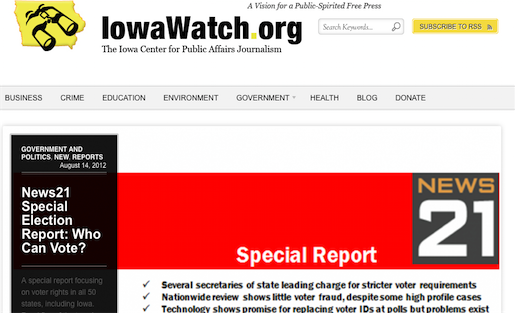It used to be taboo for one media organization to publish another’s investigation. Issues of trust, pride and reputation can still cause some news executives pause. But in many newsrooms, the prohibition against co-publishing is waning, if not dead.
Take, for instance, “Who Can Vote?“, News21 package of stories on voter fraud and ID laws across America. Co-publishing partnerships increased distribution and provided timely, important stories to local and regional news outlets.
Origins of a Collaboration
The package of 19 stories was reported by 24 students across 11 universities, led by consulting editor Leonard Downie Jr., the Weil family professor of journalism at Arizona State University’s Cronkite School of Journalism and Mass Communication and vice president at large of The Washington Post. The students found only 10 cases of in-person voter fraud across the country since 2000, raising questions about the need for voter identification laws. Their investigation also showed how politically active Republican secretaries of state have brought the spate of current laws, and the influence of the American Legislative Exchange Council, known as ALEC.

Two months before publication, News21 leaders met with the Investigative News Network (INN) to talk about whether our members, a string of independent local and regional newsrooms across the country, would be interested in publishing the “Who Can Vote?” stories. The answer: Of course. Through a series of emails, calls and newsletter postings, we got the word out. We worked closely with the News21 team on publication, staggered embargo dates, and made the stories available to INN’s 64 members.
Publishing Strategy Varies by Newsroom
Some INN newsrooms, such as PublicSource in Pittsburgh, ran a single story from the series; a number of others ran multiple stories, including MinnPost in Minnesota, which has run six pieces since the project launched on August 12 — and plans to run more of them over the next two weeks.
Don Effenberger, MinnPost’s news editor, said in an email that the stories “have gotten good response.” The main story on voter fraud performed well on minnpost.com and sparked a spirited debate.
Interestingly, that story also ran in the Washington Post and on News21’s own site the day before — showing how important it can be to reach the public through regional and local news sources, not just national ones.
To bring the stories home to their readers, many INN members pulled relevant facts about their states up higher in the story, or mentioned them in the headline. IowaWatch, which ran five of the stories, produced small sidebars about Iowa Secretary of State Matt Schultz, including a link to his 2010 campaign website and other related materials on the web.
The stories in the “Who Can Vote?” package were also picked up by national outlets, including NPR News and NBCNews.com.
Ingredients for Success
The package was well-timed, offering a deep look at an issue that’s on the minds of Americans at the moment. It included not just articles, but also interactive graphics and other multimedia elements.
Downie said in an email that he was pleased with the outcome.
“Distribution through INN members exposed the students’ work — including the only comprehensive database of election fraud in the U.S. — to influential audiences in communities we otherwise would not have reached,” he said.
He also noted that the INN-News21 partnership “enabled non-profits like MinnPost, Iowa Watch and Pine Tree Watchdog in Maine to give their readers coverage they would not otherwise have had and for which they did not have to pay.”
Often, when we talk about collaborative journalism, we talk about stories that are co-reported. But as the example of “Who Can Vote?” illustrates, co-publishing is another critical form of collaboration that can increase a project’s reach and impact.
A version of this story also appears on the Investigative News Network website.
Evelyn Larrubia is the Editorial Director of the Investigative News Network, a consortium of 64 nonprofit newsrooms in North America that produce nonpartisan investigative and public service journalism. She has been a reporter and editor for 20 years, most of it at the Los Angeles Times. Her stories have led to criminal charges and convictions and significant changes to state laws. They have garnered a dozen national journalism awards, including The Scripps Howard National Journalism Award for Investigative Reporting, the Associated Press Managing Editors Public Service Award and the Livingston Award for Young Journalists. While at the Times, Larrubia co-authored a series outlining critical failures by California’s guardianship system in protecting the elderly and disabled. She also uncovered self-dealing in Los Angeles’ $20-billion school construction program and exposed open meetings law violations by the Los Angeles County Board of Supervisors, among other stories. She has worked as a staff writer for El Nuevo Herald and the Ft. Lauderdale Sun-Sentinel and as associate editor for the Los Angeles Daily Journal. Larrubia spent the 2010-2011 academic year at Stanford University on a John S. Knight Fellowship, looking at funding models for investigative reporting and learning about reader engagement and multi-media production. She can be reached at [email protected] or @elarrubia on Twitter.

